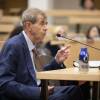Boston Mayor Michelle Wu will add more than 70 electric vehicle charging plugs to city lots in the new year and establish a strategy group to guide conversion of city-owned vehicles, striving to reduce the city's greenhouse gas emissions.
Wu, a climate advocate, in a statement said this action will move Boston closer to its long-term electric vehicle and emission reduction goals.
“These steps will contribute to cleaner air and lower emissions, advancing Boston's efforts to become a Green New Deal city,” Wu’s statement said.
Wu’s move came about a week before Mass. gubernatorial candidate state Sen. Sonia Chang-Díaz issued a statewide Green New Deal plan, which includes proposals to eliminate bus fares at the MBTA and regional transit authorities and electrify public transit. The new mayor’s efforts build on work during the Walsh administration, setting emissions and electric vehicle charging targets.
In a recent hearing on charging infrastructure, Boston officials said the hope is that more charging stations will encourage more drivers to purchase electric vehicles. Right now, Boston has 10 electric vehicle charging stations. Three in Jamaica Plain and the rest on Beacon Hill.
“I would say I get one email, phone call or direct message a week saying, ‘I live in a multi-family building, I don’t have a driveway, I would love to have an EV, when can we get one?’” said outgoing Jamaica Plain-West Roxbury councilor Matt O’Malley during the hearing earlier this month.
Another 28 stations will be installed in Roxbury, Mattapan, Dorchester and South Boston in January, with 50 more planned for spots across the city later in 2022.
Each station costs the city a flat fee of about $2,400 — a discount provided through a partnership with Eversource, which takes care of the additional installation costs.
The city charging rate, according to the transportation department, is $0.25 per kWh. According to the U.S. Energy Information Administration, which tracks the price of electricity across the nation, the recent national average for transportation electricity was $0.11 per kWh.
The new charging stations will come online as the city stands up a new committee to cut back inefficiencies in city-owned vehicle usage.
The new Fleet Utilization Review Committee, according to city documents, will be charged with "making decisions to retain, reassign, or eliminate inefficiently-utilized vehicles and equipment."
The city, the Wu administration said, has about 1,200 vehicles in its fleet, not counting school buses or public safety vehicles.
Boston's plan builds on efforts from Wu's predecessor, Marty Walsh, who pledged to make Boston carbon neutral by 2050.
In 2018, electric vehicles represented about 3% of Boston's new vehicle registrations. In mid-2019, the city estimated there were about 2,000 electric vehicles registered throughout the city.
Walsh also established other goals: to have publicly accessible charging stations in every neighborhood by 2023; to make 23% of the city's new car purchases electric vehicles by 2025 and; to reach full electrification of light-duty vehicles by 2035.
Additionally, Wu said the city is expanding its small Good2Go electric vehicle car-sharing program. The Roxbury-based, income-tiered program began last summer and will grow from four cars to eight by “most likely by the end of the year,” according to the program’s manager.








